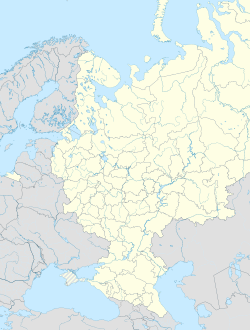Chekhov (city)
| city
Chekhov
ехов
|
||||||||||||||||||||||||||||||||||||||||||||
|
||||||||||||||||||||||||||||||||||||||||||||
|
||||||||||||||||||||||||||||||||||||||||||||
| List of cities in Russia | ||||||||||||||||||||||||||||||||||||||||||||
Chekhov ( Russian Чехов ) is a city with around 60,720 inhabitants (as of October 14, 2010) in Moscow Oblast , Russia . It is located about 80 km south of Moscow on the Lopasnja , a left tributary of the Oka , and is the administrative center of a Rajon of the Oblast.
The closest larger towns are Klimovsk , Lwowski and Podolsk from the north and Serpukhov from the south . All four are located around 20–30 km from Chekhov.
history
Chekhov is one of the younger cities in Moscow Oblast. It emerged from the village Lopasnja (Лопасня), which had existed since the 18th century at the latest. It was named after the river of the same name and was important for trade due to its location on an old road from Moscow to Tula . In 1951 the former village became an urban-type settlement after the first industrial plants were built nearby. In 1954 the place received city rights and its current name in honor of the Russian writer Anton Chekhov , who had lived in the vicinity of today's city in the 1890s.
Population development
| year | Residents |
|---|---|
| 1939 | 3,538 |
| 1959 | 13,950 |
| 1970 | 37,641 |
| 1979 | 52,497 |
| 1989 | 59.206 |
| 2002 | 72,917 |
| 2010 | 60,720 |
Note: census data
Economy and Transport
The city's industrial operations include factories for building materials, fittings and animal feed. There are also several companies in the food industry in Chekhov, such as a Danone production facility . Housing and office space construction has recently shown a remarkable development in Chekhov.
The city is connected to the M2 trunk road in the direction of Tula, Kursk and the Ukraine and has a train station on the Moscow – Kursk railway line with regular connections and the like. a. to Moscow ( Kursk train station ), Podolsk, Serpuchow or Tula.
Attractions
In the urban area is the Satschatjewskoje (Зачатьевское) estate, which once belonged to the Vasilchikov family. 12 km southwest of the city, in the village of Melichowo (Мелихово), there is the former country residence of Anton Chekhov . The former estate of the writer now houses a Chekhov Museum.
Sports
In Chekhov is with Medwedi Chekhov a well-known handball club of the Russian league. This club plays its home games in the Universal Sport Hall "Olimpijski", which was inaugurated in 2003 . The water polo players from Schturm-2002 Chekhov were three times Russian men's champions from 2004 to 2006. Until 2013, the city was also home to a well-known ice hockey club, Vitjas Chekhov .
Town twinning
-
 Fastiw , Ukraine
Fastiw , Ukraine -
 Krasnohwardijske Raion , Republic of Crimea, Ukraine
Krasnohwardijske Raion , Republic of Crimea, Ukraine -
 Kapyl , Belarus
Kapyl , Belarus -
 Ochamchira , Abkhazia
Ochamchira , Abkhazia -
 Pazardzhik , Bulgaria
Pazardzhik , Bulgaria -
 Příbram , Czech Republic
Příbram , Czech Republic -
 Saratoga Springs , New York, USA
Saratoga Springs , New York, USA
sons and daughters of the town
- Oksana Slivenko (* 1986), weightlifter
- Alexei Grischin (* 1988), ice hockey player
Individual evidence
- ↑ a b Itogi Vserossijskoj perepisi naselenija 2010 goda. Tom 1. Čislennostʹ i razmeščenie naselenija (Results of the All-Russian Census 2010. Volume 1. Number and distribution of the population). Tables 5 , pp. 12-209; 11 , pp. 312–979 (download from the website of the Federal Service for State Statistics of the Russian Federation)
Web links
- Chekhov on mojgorod.ru (Russian)
- Unofficial Portal (Russian)





